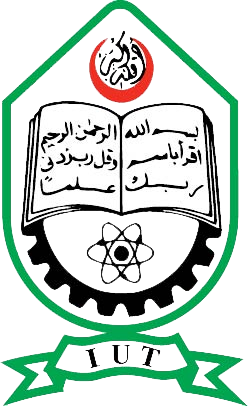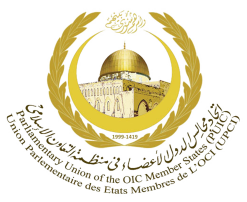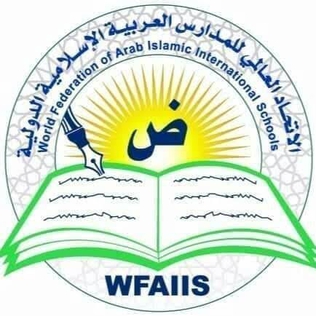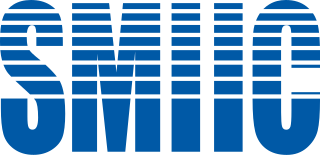
The United Nations Economic and Social Council is one of the six principal organs of the United Nations, responsible for coordinating the economic and social fields of the organization, specifically in regards to the fifteen specialised agencies, the eight functional commissions, and the five regional commissions under its jurisdiction.

The Organisation of Islamic Cooperation, formerly the Organisation of the Islamic Conference, is an intergovernmental organization founded in 1969, consisting of 57 member states, with 48 being Muslim-majority countries. The organisation states that it is "the collective voice of the Muslim world" and works to "safeguard and protect the interests of the Muslim world in the spirit of promoting international peace and harmony".

The Islamic World Educational, Scientific and Cultural Organization is a specialized organization that operates under the aegis of the Organization of Islamic Cooperation (OIC), and is concerned with fields of education, science, culture and communication in Islamic countries in order to support and strengthen relations among Member States. The Organization's headquarters is located in Rabat, Morocco, and its Director General is Dr. Salim M. Almalik.

Islamic University of Technology, commonly known as IUT, is an International Engineering University located in Gazipur, Bangladesh. IUT offers undergraduate and graduate programs in Engineering and Technical Education.

The Parliamentary Union of the OIC Member States is composed of the parliaments of the member states of the Organisation of Islamic Cooperation (OIC). It was established in Iran on 17 June 1999, with its head office situated in Tehran.

The Secretary General of the Organisation of Islamic Cooperation, is the chief administrative officer of the Organisation of Islamic Cooperation (OIC) and the head of the General Secretariat and other organs of the OIC. A secretary general is elected by the recommendation of the OIC Council of Foreign Ministers from the 57 member states for a renewable term of five years.

The Council of Foreign Ministers, formerly known as Islamic Conference of Foreign Ministers, is the main decision-making body of the Organisation of Islamic Cooperation consisting one representative from each member states of the OIC. It is the largest decision-oriented intergovernmental organization that holds conferences every year called Islamic Summit pertaining to the issues concerning Muslim nations and the OIC's agenda. The 48th summit is scheduled to be held in Islamabad, Pakistan on 22 March 2022.
Islamic Broadcasting Union formerly known as Islamic States Broadcasting Organization (ISBO), is a media and public relations wing and one of the specialised body of the Organization of Islamic Cooperation focused on the promotion of Islam and mutual cooperation between the 57 member states through by producing several radio programs. It also televises programs concerning the same issues, in addition to working for the promotion of Arabic languages. Predominantly working in the field of journalism, it highlights the social, political and cultural challenges across the Muslim nations.
Islamic Committee of the International Crescent, is an Islamic relief organization and one of the eight specialized institutions of the Organisation of Islamic Cooperation designed to serve as the main component of humanitarian aid to the 57 member states in times of the state of emergency caused by the natural disaster or military conflicts. It mainly provides medical assistance to the affected sovereign states, including permanent and non permanent member states.
Islamic Organisation for Food Security, is a food and agriculture organization and one of the eight specialized institutions of the Organisation of Islamic Cooperation focused on the development of agriculture and rural development with primary focus on widespread scarcity of food and food security of the member states. Its charter is formally signed by the 37 member states out of 57 as of 2022. The associated member states work in collaboration with IOFS.

The Independent Permanent Human Rights Commission is a human rights agency and one of the principal organs of the Organisation of Islamic Cooperation advocating for human rights within the scope of its 57 member states. It takes activities as an independent commission of the OIC and also advises its policymaking bodies and decision-making authority within the framework of human rights and fundamental rights.
Al-Quds Committee, also known by its affiliated arm name adopted in 1995, Bayt Mal Al Quds Agency, is an intergovernmental organization and one of the 4 standing committees of the Organisation of Islamic Cooperation established in July 1975. It is focused on cultural, political, social, religious and human rights issues in Jerusalem caused by the Israeli–Palestinian conflict. Its principles are predominantly focused on the protection of Al-Aqsa, and cultural heritage of the city in addition to serving as an advocacy agency specialized in humanitarian and social works, concerning health, education housing children's as well as women's rights.

Islamic Summit of the Organisation of Islamic Cooperation is one of the five highest decision-making bodies of the OIC, the other four being the OIC Council of Foreign Ministers, Standing Committees, Executive Committee, and the International Islamic Court of Justice. The Islamic Summit is a principle organ of the OIC focused on formulation, development, and implementation of decisions made by 57 member states. The Summit is attended by the concerned heads of state such as prime ministers, presidents, emirs and other equivalent heads.

Women Development Organization, is an intergovernmental organisation and one of the eight specialized institutions of the Organisation of Islamic Cooperation focused on conducting major steps for women's development. It plays a central role in structuring and maintaining internal regulations for women's empowerment with the 15 Islamic countries out of 57 member states. It is principally focused on four standards, including women's role in combating extremism, women in positions of power and decision-making, women's protection against violence, and women's empowerment, economic development and financial inclusion.

World Federation of Arabo-Islamic International Schools, also known as the World Federation of International Arab Islamic Schools or International Arab-Islamic Schools Federation, is an intergovernmental, international, and one of the 17 affiliated organizations of the Organisation of Islamic Cooperation that represents Arab Islamic schools and branches across the world and 57 member states. The federation has maintained a supportive environment focused on the promotion and providing assistance to Arab educational institutions. It is principally focused on dissemination of the Islamic culture, Arabic languages, the Quran in the schools and cultural centers.

The Charter of the Organisation of Islamic Cooperation, commonly known as OIC Charter, is the foundational treaty of the Organisation of Islamic Cooperation. Its foundational principles are based on 18 chapters that objectively maintains the purpose, focus, functions, and foundation of the OIC, an intergovernmental organization founded in 1969. The charter was formally signed on 25 September 1969 by the 57 member states, including 5 observer states. However, it was revised by the 11th summit held in Dakar, Senegal on 14 March 2008.

The OIC Computer Emergency Response Team, commonly known as OIC-CERT, is a computer emergency response team and one of the 17 affiliated organs of the Organisation of Islamic Cooperation. Focused on global cybersecurity in the 27 member and non-member states, it is considered the world's third-largest computer emergency response team coordinated by the 27 countries. The OIC-CERT is primarily focused on providing emergency support in cyber resilience with global collaboration with its associated members and information security organizations. It also encourages member states to implement cybersecurity policies by their respective CERTs.

General Secretariat of the Organisation of Islamic Cooperation, commonly known as General Secretariat, is an executive body and primary organ of the Organisation of Islamic Cooperation consists secretary general and staff members of the OIC, the second-largest intergovernmental organization after the United Nations. General Secretariat is tasted with decision implementation, in addition to maintaining entire organisation, including its charter. It also maintains Standing Committees, Executive Committee and the Independent Permanent Human Rights Commission across the 57 member states. It manages subsidiaries, specialized, and affiliated institutions of the OIC with prime focus on OIC Council of Foreign Ministers and Islamic summit conducted by the 57 member states.
The OIC Broadcasting Regulatory Authorities Forum, also referred to as Organisation of Islamic Cooperation Broadcasting Regulatory Authorities Forum or the International Broadcasting Regulatory Authorities Forum, is an intergovernmental and one of the 17 affiliated institutions of the Organisation of Islamic Cooperation focused on establishment of cooperation between the OIC and broadcasting regulatory authorities of the 36 member states out of 57. It is principally focused on conducting measures against the backdrop of digitalization and convergence.

Standards and Metrology Institute for Islamic Countries is an intergovernmental and one of the 17 affiliated organizations of the Organisation of Islamic Cooperation. Its primary focus is on standardization and metrology technical elements. It is principally focused on the procedures for the removal of technical barriers concerning standards covering materials, manufacturers and products. It coordinates with the 37 member states and two observers for the administrative tasks for the trade development within the framework of the OIC.








